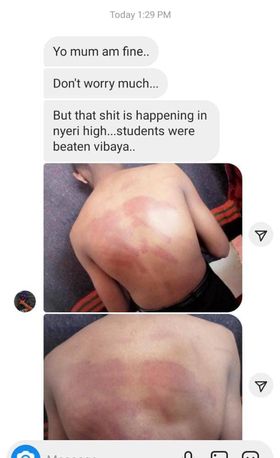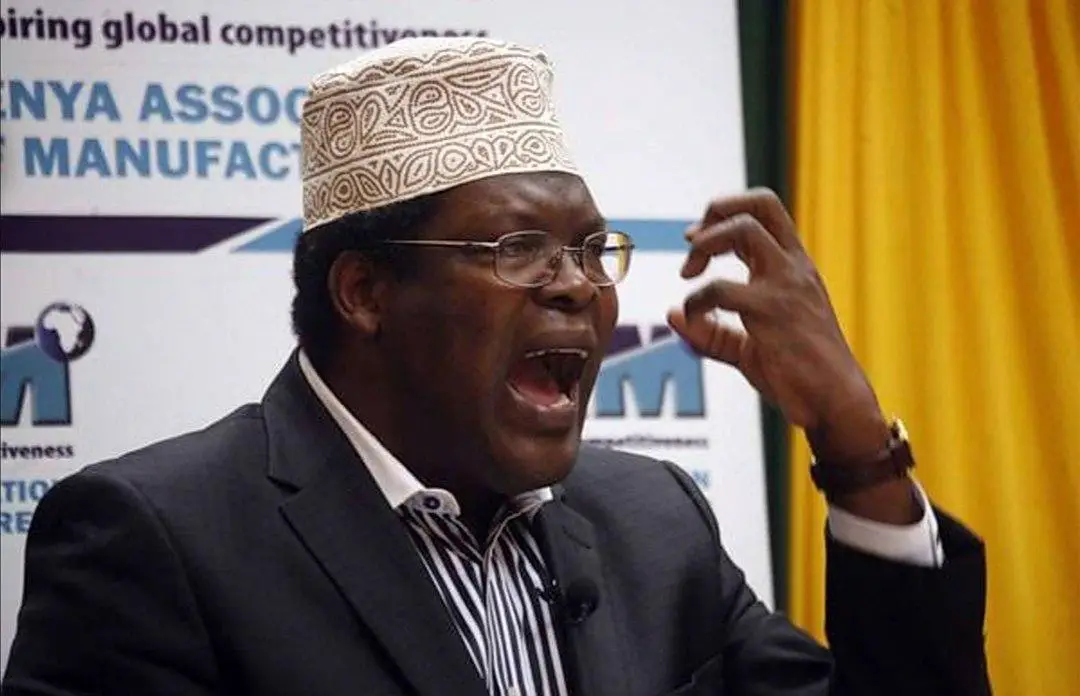
Students at Nyeri High School have gone on strike.
This comes a week after this blog highlighted an ugly incident of corporal punishment at the nationally recognized academic giant.
Reports say that the furious learners mounted a revolt in the early hours of Monday, June 27, to protest rampant cases of teacher brutality at the school.
A parent who had earlier spoken to us on Tuesday, June 21, raised profound concerns of active barbarism meted upon students by rogue tutors.
She specifically brought up an event where a purportedly drunk teacher ruthlessly disciplined a group of senior boys for allegedly bullying their juniors in Form 2.
The tutor identified as Mr. Nahshon apparently found out that the students had forcefully coerced their younger counterparts into executing their evening chores.
The whip marks on their backs were a true testament that they dearly paid for their mistake.



Corporal punishment has been used as a discipline management procedure in Kenya since the inception of formal teaching by the colonialists and has, for a long time, been one of the most-ranging and contentious issues in the education sector.
The government banned corporal punishment in Kenyan schools back in 2001 and enacted the Children’s Act, which entitles children to protection from all forms of abuse and violence.
However, the right to “administer reasonable punishment”, while rendered void under the Constitutional prohibition, is still yet to be formally repealed.
Because of this, the outlawed practice remains rampant in various schools; both public and private.
Before the Nyeri High School incident, we had reported how a distressed parent raised the alarm over a video clip that surfaced on social media, which supposedly showed an incident of corporal punishment at Sunshine Secondary School in Nairobi.
The enraged guardian openly acknowledged a bitterly hostile environment at the private boys’ boarding school in Lang’ata constituency and opposed what she termed as excessive flogging of students.
VIDEO: Corporal Punishment At Moi Family-Owned Sunshine Secondary School
Many times, students have complained of harsh retribution from teachers who believe that it is the most effective way of disciplining students.
Corporal punishments may appear to be a more powerful and attractive behavior of management strategy but can come at a significant cost
Negative side effects accompany most of these punishments, especially for students who are fond of making mistakes.
Most times, establishing corporal punishment to change students’ behavior creates resentment and damages the relationship between a student and a teacher.
Experts have often advised that teachers should understand the pros and cons and know what to consider before using such punishments because some mistakes do not need a discipline technique but guidance and counseling.
This blog strongly condones the practice that the Ministry of Education led by Prof George Magoha seems to actively encourage.
In December 2021, he called for the return of tougher correctional measures to arrest the rising cases of indiscipline in schools.
“We need to re-introduce canning in schools like yesterday. And parents should discipline children and stop expecting our teachers to do the impossible,” he said.
“I was caned many times and I did not die, I became better, so the people who are holding children like eggs is one of the reasons why our children cannot handle stress,” he added.
His sentiments were, however, seconded by some while meeting crude opposition from others.
What is your opinion on this controversial subject?
Should corporal punishment be allowed in schools?
If so, what should be the limits?
Let us know your opinion by sharing it with us through any of our social media outlets.

















































